| Hill News |
U.S. House Passes Bill To Restore $4.4 Billion
In Highway Funding
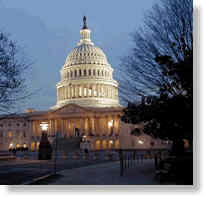 Bipartisan
legislation which restores a minimum of $4.4 billion in
federal highway funding in Fiscal Year 2003 was overwhelmingly
approved by the U.S. House of Representatives on May 14, 2002.
H.R. 3694, the "Highway Funding Restoration Act", passed the
House by a vote of 410 to 5. The bill, which had 317
cosponsors, including all 75 members of the Transportation and
Infrastructure Committee, increases the guaranteed level of
highway funding for fiscal year 2003 to at least $27.7
billion, the level authorized in TEA 21. Bipartisan
legislation which restores a minimum of $4.4 billion in
federal highway funding in Fiscal Year 2003 was overwhelmingly
approved by the U.S. House of Representatives on May 14, 2002.
H.R. 3694, the "Highway Funding Restoration Act", passed the
House by a vote of 410 to 5. The bill, which had 317
cosponsors, including all 75 members of the Transportation and
Infrastructure Committee, increases the guaranteed level of
highway funding for fiscal year 2003 to at least $27.7
billion, the level authorized in TEA 21.
The passage came after a compromise
between the House Transportation & Infrastructure
Committee and House appropriators left the Revenue Aligned
Budget Authority (RABA) mechanism in place, while calling for
its revision in the future. The funding cut in the Bush
Administration budget was largely due to RABA. For an
explanation of the mechanism, see STPP’s Decoding
Transportation Policy and Practice at
http://www.transact.org/decoders.htm.
For more informationon H.R. 3694,
click
here.
$59 Billion Rail Bill
Approved By Congressional Subcommittee
The U.S. House Subcommittee on
Railroads approved legislation May 9, 2002 that would provide
a mix of grant and bond and loan authority totaling $59
billion for high-speed rail and rail infrastructure projects.
Transportation Committee Chair Don Young (R-Alaska) and
Railroads Subcommittee Chair Jack Quinn (R-NY) introduced the
Railroad Infrastructure Development and Expansion Act for the
21st Century (RIDE 21) - H.R. 2950. RIDE 21 establishes
authority for states or interstate compacts to issue $12
billion in federal tax-exempt bonds and $12 billion in federal
tax-credit bonds for infrastructure improvements for
high-speed passenger railroad infrastructure over 10
years.
"RIDE 21 is an historic commitment
from this Congress to improve and expand our nation's rail
infrastructure and develop a viable high speed rail system,"
said Young. "This bill addresses the increasing needs of our
passenger and freight rail systems and the growing congestion
problems that hinder our other transportation
systems."
For more information, click here.
Rally in Support of Rail
Held in Washington, DC
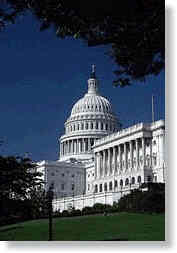 Hundreds of
citizens from across the country gathered May 8, 2002 to urge
Congress to support passenger rail as an integral part of the
national transportation system and to provide full funding for
Amtrak in 2003 and beyond. “Rally for Rail” participants
represented many businesses, labor unions, and state and local
governments, as well as millions of consumers and citizens
across America. Hundreds of
citizens from across the country gathered May 8, 2002 to urge
Congress to support passenger rail as an integral part of the
national transportation system and to provide full funding for
Amtrak in 2003 and beyond. “Rally for Rail” participants
represented many businesses, labor unions, and state and local
governments, as well as millions of consumers and citizens
across America.
"Today’s event demonstrates that
people from all across America and across the political
spectrum want a stronger passenger rail system in this
country," said Fort Worth, Texas Mayor Kenneth Barr, chairman
of the Transportation and Communications Committee of the U.S.
Conference of Mayors. "We are all united in the conviction
that it’s time to put Amtrak on a more stable foundation for
the future, and to have it play a growing role in our
country’s congested transportation system."
For more information, click here.
|
| NHTSA Details High Costs of
Motor Vehicle Crashes |
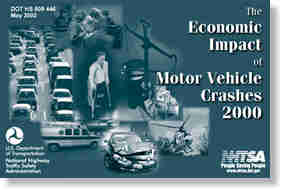 On May 9, 2002, U.S.
Transportation Secretary Norman Y. Mineta announced that the
economic impact of motor vehicle crashes on America's roadways
has reached $230.6 billion a year, or an average of $820 for
every person living in the United States. The announcement was
based on a new research study released today by the U.S.
Department of Transportation's National Highway Traffic Safety
Administration (NHTSA). On May 9, 2002, U.S.
Transportation Secretary Norman Y. Mineta announced that the
economic impact of motor vehicle crashes on America's roadways
has reached $230.6 billion a year, or an average of $820 for
every person living in the United States. The announcement was
based on a new research study released today by the U.S.
Department of Transportation's National Highway Traffic Safety
Administration (NHTSA).
The new report, based on calendar
year 2000 data, details how the economic costs of motor
vehicle accidents has grown to a level that is 2.3 percent of
the U.S. Gross Domestic Product. This total
includes:
· $61 billion in lost workplace
productivity
· $20.2 billion in lost household
productivity
· $59 billion in property damage
· $32.6
billion in medical costs
· $25.6 billion in travel delay
costs.
To read the report, click here.
|
| New Study Finds One in Four US Bridges
Deficient |
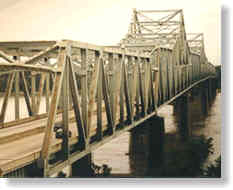 A new report from the
Road Information Program (TRIP), an interest group of the
transportation construction industry, finds approximately one
in four of the country’s major, heavily traveled bridges is
deficient and in need of repair or replacement. The report
warns that federal and state funding shortfalls in 2003 could
reverse recent gains in bridge repair. A new report from the
Road Information Program (TRIP), an interest group of the
transportation construction industry, finds approximately one
in four of the country’s major, heavily traveled bridges is
deficient and in need of repair or replacement. The report
warns that federal and state funding shortfalls in 2003 could
reverse recent gains in bridge repair.
However, STPP's review of state
spending patterns shows that while most states received an
enormous increase in federal transportation funds in 1998
through TEA-21, only a few increased the portion of funds
going to road and bridge repair. Four of the states ranked in
the bottom ten by TRIP for bridge condition, (Oklahoma,
Mississippi, Iowa, and Missouri), actually spent a smaller
portion of their federal dollars on road and bridge repair at
the end of the 1990s despite overall federal funding increases
ranging from 42 to 58 percent. TRIP is recommending a 44
percent increase in federal investment in bridges.
For more information on the TRIP
report, visit http://www.tripnet.org/. For figures on
state spending records, see STPP’s
Changing Direction.
|
| AASHTO TEA-21 Plan Expected to Tap
General Fund For Highways |
The American Association of State Highway and
Transportation Officials (AASHTO) is recommending the creation
of a new Transportation Finance Corporation, a federal
corporation that would be able to sell tax-credit bonds to
support highway, transit and railroad spending as a means for
increasing spending levels during the next reauthorization
period of TEA-21. The proposal, which seeks to maintain growth
in federal highway and transit spending in the post-TEA-21
period, seeks to avoid calling on Congress to raise taxes
directly, but instead will rely on tax spending to carry
future increases in highway and transit spending. These
expenditures would be financed by the 'general fund' rather
than transportation taxes that are now dedicated to
transportation through the Highway Trust Fund.
As outlined, the AASHTO financing
plan calls for a new federally-sponsored financing agency
modeled after the Federal National Mortgage Association
(Fannie Mae), with the new corporation slated to raise about
$59.5 billion over six years. $16.9 billion of the money would
be set aside to create an investment fund to pay off the bond
principal, approximately $34.1 billion would go to highways,
and $8.5 billion would go to transit projects. An additional
$5 billion in federal support would be placed in a revolving
fund to support additional highway, transit, and seaport
projects.
The proposal is unclear on what
happens after the six-year period of TEA-21 renewal. The
nearly $60 billion provided by the new federal corporation
cannot be sustained in the period after the next cycle of
TEA-21, which could result in a $60 billion hole in the
baseline of funding for the successor law due in
2009.
For more information, click here.
|
| CA Emissions Bill Delayed; Would
Regulate Greenhouse Gases |
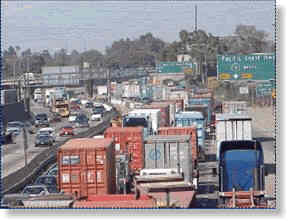 The California State Assembly
on May 14, 2002 delayed a final vote on a bill that would
create the nation’s first restrictions on carbon dioxide and
other automobile emissions that contribute to global warming.
A.B. 1058 was initially approved by both the state Assembly
(on January 30th) and Senate (on May 2nd). Before the bill can
be sent to Governor Davis for his signature, however, the
Assembly must approve several amendments that were added in
the Senate that would ensure that the regulations provide
environmental and economic benefits without limiting consumer
choice. The bill would limit CO2 emissions, a combustion
byproduct that can only be reduced through greater fuel
efficiency or less driving. The auto industry has been turning
up the pressure on key Assembly members to change their
original votes and has launched a $3 million campaign against
A.B. 1058. The California State Assembly
on May 14, 2002 delayed a final vote on a bill that would
create the nation’s first restrictions on carbon dioxide and
other automobile emissions that contribute to global warming.
A.B. 1058 was initially approved by both the state Assembly
(on January 30th) and Senate (on May 2nd). Before the bill can
be sent to Governor Davis for his signature, however, the
Assembly must approve several amendments that were added in
the Senate that would ensure that the regulations provide
environmental and economic benefits without limiting consumer
choice. The bill would limit CO2 emissions, a combustion
byproduct that can only be reduced through greater fuel
efficiency or less driving. The auto industry has been turning
up the pressure on key Assembly members to change their
original votes and has launched a $3 million campaign against
A.B. 1058.
For more information on
California's Clean Car Legislation from the National Resources
Defense Council, click here.
|
| Rural Residents Face Increased
Automotive Fatality Rate |
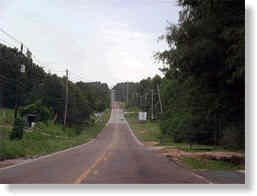 According to a recent study,
people living in rural areas face a higher risk of dying a
violent death -- defined as a fatal car crash or homicide by
someone other than a spouse, relative or friend -- than
persons who live in a city. William H. Lucy, author of the
study and professor of urban and environmental planning at the
University of Virginia, focused on eight urban areas
(Pittsburgh, Baltimore, Chicago, Dallas, Houston, Milwaukee,
Minneapolis-St. Paul, Philadelphia and the suburbs and
counties surrounding them) for three to four years to test
theories that dictate where people live and how they decide
what is safe. According to a recent study,
people living in rural areas face a higher risk of dying a
violent death -- defined as a fatal car crash or homicide by
someone other than a spouse, relative or friend -- than
persons who live in a city. William H. Lucy, author of the
study and professor of urban and environmental planning at the
University of Virginia, focused on eight urban areas
(Pittsburgh, Baltimore, Chicago, Dallas, Houston, Milwaukee,
Minneapolis-St. Paul, Philadelphia and the suburbs and
counties surrounding them) for three to four years to test
theories that dictate where people live and how they decide
what is safe.
Although homicide rates are
generally higher in the cities than in rural areas, Lucy
argues that the danger presented by an increased level of
fatal car crashes can make rural areas more dangerous than
urban areas, supporting the premise that people tend to
overestimate the risks of crime while underestimating the
risks of driving.
To read an article on the report,
click here.
|
| In Other News |
APTA Calls For Grant Proposals
The American Public Transportation
Association (APTA) has announced their 2002 guidelines for
local transit coalition grants. These small grants (under
$5,000) are to support projects and activities oriented toward
federal reauthorization efforts.
For more information, click here.
Atlanta Smog Reprieve
Granted
The Environmental Protection Agency
extended Atlanta's deadline to meet federal clean air
standards to 2004, stating that nitrogen oxides generated
elsewhere are drifting into metro Atlanta. Alabama is the
primary source of the pollution, along with Tennessee,
Kentucky, South Carolina and North Carolina. For more
information, click here.
Call for Papers
A call for papers has been issued
for the Fourth International Conference on Walking in the 21st
Century. The deadline for proposals and abstracts is July 1,
2002. Please visit http://americawalks.org/walk21/ for more
details.
Internship Opportunity at
STPP
This position will conduct
strategic research and grassroots organizing to support the
organization of the Alliance for a New Transportation Charter.
Activities will generally consist of gathering information to
support STPP's model campaigns, assisting with outreach to add
members to the Alliance and support for our grassroots network
in conducting activities such as candidate education. See a
complete job description at http://www.transact.org/
| |
|
| |
In
Brief... |
| |
Internship Opportunity at STPP
This position will conduct strategic research and
grassroots organizing to support the organization of the
Alliance for a New Transportation Charter. See a complete job
description at http://www.transact.org/.
|
| |
Calendar |
| |
House
Schedule
May 16: T&I Over-the-Road Bus Security and
Safety Act markup
May 21: T&I hearing on relieving highway
congestion through capacity enhancements and increased
efficiency (tentative)
Date TBA: T&I Intermodalism hearing (postponed
from May 15)
Senate Schedule
May
15: Banking Committee affordable housing
hearing
May 15: EPW Transportation Planning and Smart Growth
hearing
(listen online now)
Transportation and University Communities
Conference
June 15-18, 2002: Amherst,
MA
National Leadership Summit to Eliminate
Racial & Ethnic Disparities in Health
July 10-12,
2002
BikeFest 2002
August 2-4, 2002; Amherst,
MA
Pro Bike / Pro Walk 2002
September
3-6, 2002; St. Paul, MN
|
| |
|
| |
| |

 Bipartisan
legislation which restores a minimum of $4.4 billion in
federal highway funding in Fiscal Year 2003 was overwhelmingly
approved by the U.S. House of Representatives on May 14, 2002.
H.R. 3694, the "Highway Funding Restoration Act", passed the
House by a vote of 410 to 5. The bill, which had 317
cosponsors, including all 75 members of the Transportation and
Infrastructure Committee, increases the guaranteed level of
highway funding for fiscal year 2003 to at least $27.7
billion, the level authorized in TEA 21.
Bipartisan
legislation which restores a minimum of $4.4 billion in
federal highway funding in Fiscal Year 2003 was overwhelmingly
approved by the U.S. House of Representatives on May 14, 2002.
H.R. 3694, the "Highway Funding Restoration Act", passed the
House by a vote of 410 to 5. The bill, which had 317
cosponsors, including all 75 members of the Transportation and
Infrastructure Committee, increases the guaranteed level of
highway funding for fiscal year 2003 to at least $27.7
billion, the level authorized in TEA 21. Hundreds of
citizens from across the country gathered May 8, 2002 to urge
Congress to support passenger rail as an integral part of the
national transportation system and to provide full funding for
Amtrak in 2003 and beyond. “Rally for Rail” participants
represented many businesses, labor unions, and state and local
governments, as well as millions of consumers and citizens
across America.
Hundreds of
citizens from across the country gathered May 8, 2002 to urge
Congress to support passenger rail as an integral part of the
national transportation system and to provide full funding for
Amtrak in 2003 and beyond. “Rally for Rail” participants
represented many businesses, labor unions, and state and local
governments, as well as millions of consumers and citizens
across America. On May 9, 2002, U.S.
Transportation Secretary Norman Y. Mineta announced that the
economic impact of motor vehicle crashes on America's roadways
has reached $230.6 billion a year, or an average of $820 for
every person living in the United States. The announcement was
based on a new research study released today by the U.S.
Department of Transportation's National Highway Traffic Safety
Administration (NHTSA).
On May 9, 2002, U.S.
Transportation Secretary Norman Y. Mineta announced that the
economic impact of motor vehicle crashes on America's roadways
has reached $230.6 billion a year, or an average of $820 for
every person living in the United States. The announcement was
based on a new research study released today by the U.S.
Department of Transportation's National Highway Traffic Safety
Administration (NHTSA).
 A new report from the
Road Information Program (TRIP), an interest group of the
transportation construction industry, finds approximately one
in four of the country’s major, heavily traveled bridges is
deficient and in need of repair or replacement. The report
warns that federal and state funding shortfalls in 2003 could
reverse recent gains in bridge repair.
A new report from the
Road Information Program (TRIP), an interest group of the
transportation construction industry, finds approximately one
in four of the country’s major, heavily traveled bridges is
deficient and in need of repair or replacement. The report
warns that federal and state funding shortfalls in 2003 could
reverse recent gains in bridge repair.
 The California State Assembly
on May 14, 2002 delayed a final vote on a bill that would
create the nation’s first restrictions on carbon dioxide and
other automobile emissions that contribute to global warming.
A.B. 1058 was initially approved by both the state Assembly
(on January 30th) and Senate (on May 2nd). Before the bill can
be sent to Governor Davis for his signature, however, the
Assembly must approve several amendments that were added in
the Senate that would ensure that the regulations provide
environmental and economic benefits without limiting consumer
choice. The bill would limit CO2 emissions, a combustion
byproduct that can only be reduced through greater fuel
efficiency or less driving. The auto industry has been turning
up the pressure on key Assembly members to change their
original votes and has launched a $3 million campaign against
A.B. 1058.
The California State Assembly
on May 14, 2002 delayed a final vote on a bill that would
create the nation’s first restrictions on carbon dioxide and
other automobile emissions that contribute to global warming.
A.B. 1058 was initially approved by both the state Assembly
(on January 30th) and Senate (on May 2nd). Before the bill can
be sent to Governor Davis for his signature, however, the
Assembly must approve several amendments that were added in
the Senate that would ensure that the regulations provide
environmental and economic benefits without limiting consumer
choice. The bill would limit CO2 emissions, a combustion
byproduct that can only be reduced through greater fuel
efficiency or less driving. The auto industry has been turning
up the pressure on key Assembly members to change their
original votes and has launched a $3 million campaign against
A.B. 1058.
 According to a recent study,
people living in rural areas face a higher risk of dying a
violent death -- defined as a fatal car crash or homicide by
someone other than a spouse, relative or friend -- than
persons who live in a city. William H. Lucy, author of the
study and professor of urban and environmental planning at the
University of Virginia, focused on eight urban areas
(Pittsburgh, Baltimore, Chicago, Dallas, Houston, Milwaukee,
Minneapolis-St. Paul, Philadelphia and the suburbs and
counties surrounding them) for three to four years to test
theories that dictate where people live and how they decide
what is safe.
According to a recent study,
people living in rural areas face a higher risk of dying a
violent death -- defined as a fatal car crash or homicide by
someone other than a spouse, relative or friend -- than
persons who live in a city. William H. Lucy, author of the
study and professor of urban and environmental planning at the
University of Virginia, focused on eight urban areas
(Pittsburgh, Baltimore, Chicago, Dallas, Houston, Milwaukee,
Minneapolis-St. Paul, Philadelphia and the suburbs and
counties surrounding them) for three to four years to test
theories that dictate where people live and how they decide
what is safe.